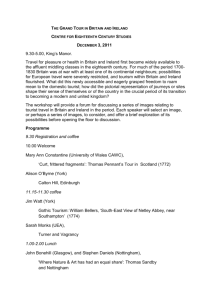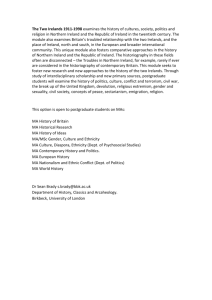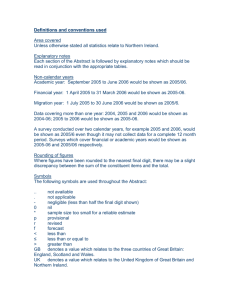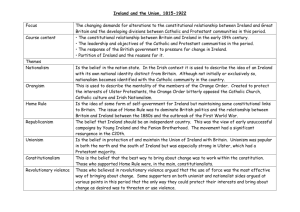SOVEREIGNTY AND PARTITION : WORLD WAR 2 AND
advertisement
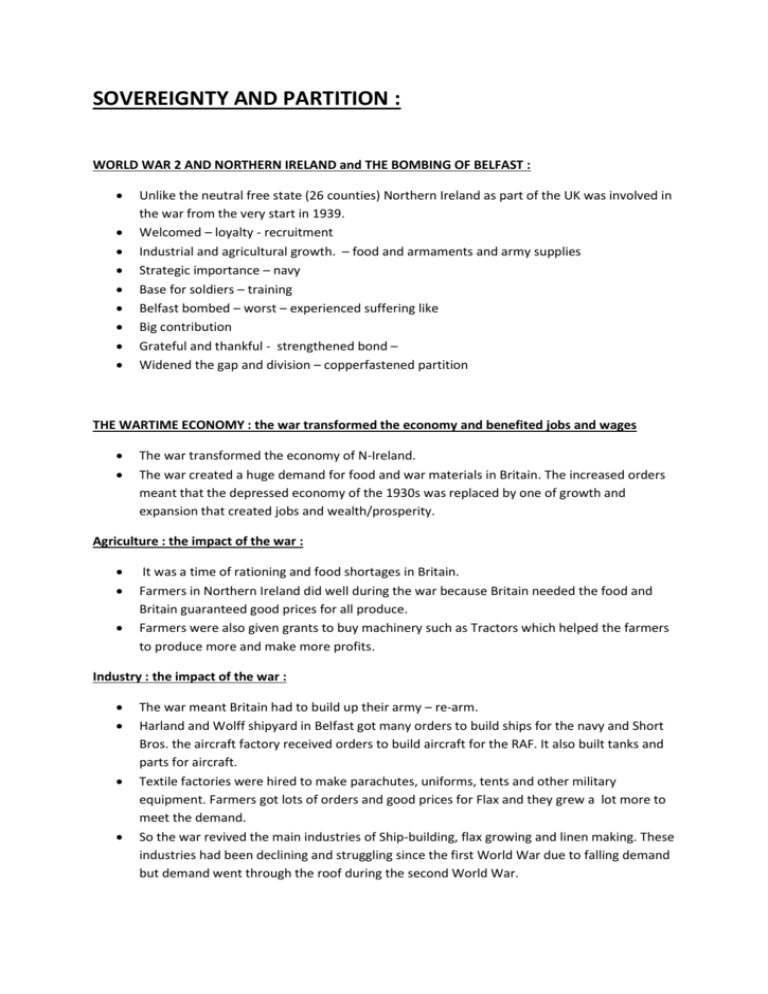
SOVEREIGNTY AND PARTITION : WORLD WAR 2 AND NORTHERN IRELAND and THE BOMBING OF BELFAST : Unlike the neutral free state (26 counties) Northern Ireland as part of the UK was involved in the war from the very start in 1939. Welcomed – loyalty - recruitment Industrial and agricultural growth. – food and armaments and army supplies Strategic importance – navy Base for soldiers – training Belfast bombed – worst – experienced suffering like Big contribution Grateful and thankful - strengthened bond – Widened the gap and division – copperfastened partition THE WARTIME ECONOMY : the war transformed the economy and benefited jobs and wages The war transformed the economy of N-Ireland. The war created a huge demand for food and war materials in Britain. The increased orders meant that the depressed economy of the 1930s was replaced by one of growth and expansion that created jobs and wealth/prosperity. Agriculture : the impact of the war : It was a time of rationing and food shortages in Britain. Farmers in Northern Ireland did well during the war because Britain needed the food and Britain guaranteed good prices for all produce. Farmers were also given grants to buy machinery such as Tractors which helped the farmers to produce more and make more profits. Industry : the impact of the war : The war meant Britain had to build up their army – re-arm. Harland and Wolff shipyard in Belfast got many orders to build ships for the navy and Short Bros. the aircraft factory received orders to build aircraft for the RAF. It also built tanks and parts for aircraft. Textile factories were hired to make parachutes, uniforms, tents and other military equipment. Farmers got lots of orders and good prices for Flax and they grew a lot more to meet the demand. So the war revived the main industries of Ship-building, flax growing and linen making. These industries had been declining and struggling since the first World War due to falling demand but demand went through the roof during the second World War. Large numbers of American and British troops were stationed in Northern Ireland during the war to train before they were sent to Europe. ( 250,000 US troops trained for D-Day in Derry) Large barracks had to be built for them, airfields were built and people made money out of selling goods and services to these soldiers. Production figures, jobs and wages. Harland and Wolff produced 140 warships and 123 merchant ships during the war. Employment increased from 7,200 to 20,000. Short’s aircraft firm built 1,200 bombers and employment rose from 6,000 to 23,000. Workers were employed in Agriculture and in building and maintaining the barracks for US and British troops. The number out of work fell from 30% in the 1930s to 5% in 1943. Wages rose a lot. Before the war the average wage in Northern Ireland was 60% of the average wage in Britain. In 1945 it was 75% of the average wage in Britain. THE BOMBING OF BELFAST : - 4 TIMES IN A MONTH 1) 2) 3) 4) April 7, 1941 - small scale April 15, 1941 – massive attack – worst in Britain or Ireland during the war. First week of May First week of May A PRIME TARGET - NO PLANS MADE – POOR DEFENCES After Hitler took over France in 1940 he started bombing cities in Britain to destroy factories making arms for the British army and to try to get Britain to surrender. The German airforce (Luftwaffe) bombed most cities that were making materials for British forces. Despite the fact that Belfast was making a big contribution to the British war effort (shipbuilding and aircraft making) making it a target for the Germans Northern Ireland leaders thought that Belfast was too far from Germany to be in any danger. They did very little to organise defences for the city. They under-estimated the threat and did not anticipate or make plans for and attack. There were few anti-aircraft guns or bomb shelters. Whereas Glasgow had 88 anti-aircraft guns Belfast only had 24. No air-raid shelters were built. Only 3,00 people were evacuated from the city. Nothing was done to prepare hospitals or the fire service for what might happen. In November 1940 the German airforce took photographs of the city to pick out targets for and attack. THE FIRST ATTACK : Took place on 7th April 1941. 6 bombers – killed 13 people – small scale – dropped bombs on the harbour area. WORST ATTACK : 15 TH APRIL Involved 180 aircraft and 90 bomber. Wave after wave of attack on the almost undefended city. Lasted 5 hours between 11.00 pm and 4.00 am. Led to huge loss of life and destruction of property. 1,000s of pounds of bombs were dropped – they missed the ship yards and exploded among workers houses. They dropped a new type of bomb – parachute mines – one of these destroyed 42 houses when it exploded. The bombs knocked out the telephone lines and the water mains making it difficult for fire fighters and rescue workers. DeValera sent fire brigades from the south when Northern Politicians asked for help, but they could do little as the water mains was out. At least 900 people were killed. The attack left 100,000 people homeless. It was the most severe attack experience by any city in Britain or Northern Ireland during the war. Every night after the attack, for month, over 100,000 people left the city at night and slept in barns and fields. There were two more attacks in the first week of May and in total all the attacks caused the deaths of 1,100 people and the destruction of 56,000 houses. NORTHERN IRELANDS CONTRIBUTION TO THE WAR EFFORT : 38,000 men joined the British army from Northern Ireland – although some of them were men who had come up from the South to join. The Royal Navy used the ports of Northern Ireland as bases. From these bases they would organise and send convoys to protect ships carrying food and armaments from America to Britain. A huge naval harbour was built in Derry to give a base for the Royal Navy and its ships. This meant that Northern Ireland was of strategic importance. US and British troops trained in Northern Ireland. Food from Northern Ireland helped save many in Britain from starvation. Northern Ireland supplied war materials to the army – ships, aircraft, parts, parachutes, tents etc) THE IMPACT OF THE WAR ON THE IDENTITY OF NORTHERN IRELAND. It strengthened the bond between Northern Ireland and the UK and widened the gap between North and South. The British leaders and people were grateful for all the help Northern Ireland had given during the war. – food and war materials It made British leaders think that Northern Ireland was very important to the defence of Britain in times of war. – the ports were essential to the navy and the protection of the Atlantic shipping routes. The people of Northern – Ireland and Britain had both suffered at the hands of the German army in a way that the people in the South had not. Northern Ireland had prospered and its economy had grown during the war but the South had got poorer. All these factors meant that the division between North and South had gotten wider – Northern Ireland felt even closer to the UK and Britain felt that Northern Ireland was very important to its future. This meant that partition had been strengthened and any chance of a United Ireland seemed even smaller than before.
